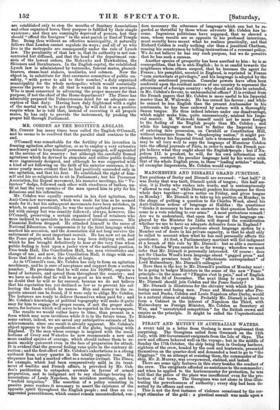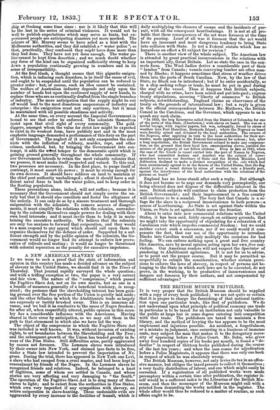PIRACY AND MUTINY IN AUSTRALIAN WATERS.
A STORY told in a letter from Geelong is more unpleasant than surprising. The Georgians sailed from Greenock on the 12th July, with 300 Government emigrants from the Isle of Skye. The crew and officers behaved well on the voyage ; but in the middle of Sunday the 17th October, the ship being then in Geelong harbour, eighteen of the crew, headed by the cook and boatswain, presented themselves on the quarter-deck and demanded a boat to go to "the Diggings." On an attempt at resisting them, the commander of the ship, Mr. R. Murray, was overpowered, stabbed, and lashed. There are some ugly features in this story besides the conduct of the crew. The emigrants afforded no assistance to the commander; and when he applied to the harbourmaster for protection, he was told that the police of the place was insufficient even for the pro- tection of the town. The Georgiana was not alone in thus illus- trating the powerlessness of authority ; every ship had been de- serted by its officers and crew.
This is not the first instance of violence occasioned by the cor- rupt stimulus of the gold : a piratical assault was made upon a
ship at Geelong some time since : nor is it likely that this will be the last in the series of criminal violences. It would not be well to publish expectations which may serve as hints, but ex- perienced people are anticipating disasters yet more marked. The seizure of Mr. Murray seems to have acted as a hint with the Melbourne authorities, and they did establish a " water police "; so that, practically, they confessed they might have done more than they had done. They have not yet done enough. The water po- lice cannot be kept from desertion ; and we much doubt whether any force of the kind can be organized sufficiently strong to keep down a population continually growing in numbers and in its sense of irresponsibility. At the first blush, a thought occurs that this gigantic emigra- tion, which is inducing such disorders, is in itself the cause of evil, and ought to be suspended until the population can be reduced to greater order : but, of course, such an idea cannot be sustained. The welfare of Australian industry depends not only upon the number of hands but upon the continued supply of new hands, to replace those who are as continually drafted from the staple branches of industry. The mere anticipation that the supply might be cut off would lead to the most disastrous suspensions of industry and enterprise : the emigration must not only continue, but it must be maintained with all possible steadiness and activity.
At the same time, on every account the Imperial Government is bound to see that order be enforced. The colonists themselves insist upon that civil right of every community. The gold- diggers, amongst whom the value for strict law might be expected to exist in its weakest form, have publicly met and in the most emphatic language demanded a performance of this duty on the part of Government. The neglect of it not only exasperates the colo- nists with the infliction of robbery, murder, rape, and other crimes, unchecked, but, by bringing the Government into con- tempt, it adds the worst temper to the democratic spirit which is gaining ground generally throughout the whole community. If our Government intends to retain the most valuable colonies that we possess, it must make itself respected and valued. To this end, two processes are necessary. In the first place, to purge itself of contempt, it must assert its power ; it must be strong enough for its own decrees. It should have soldiers on land to maintain at the chief post authority, unchallenged ; afloat it should have a suf- ficient naval force to back the water police, and to keep order in the floating population. These precautions alone, indeed, will not suffice ; because it is necessary that the Government should not simply, coerce the un- ruly but that it should also conciliate and foster the allegiance of the orderly. It can only do so by a sincere treatment and thorough cooperation with the colonists. To remove sources of disagree- ments, it must simplify the relations with the colonies, surrender- ing to the colonists themselves ample powers for dealing with their own local interests; and it must invite them to help it in main- taining the executive authority. We believe that the colonists are only too anxious to forward that cooperation, and they would to a man respond to any appeal which should call upon them to organize themselves for the defence of order. Supported by a suf- ficient strength and by the public opinion of the colonists, the Go- vernment would no longer find its attempt to enforce law provo- cative of ridicule and mutiny ; it would no longer be threatened with colonial separation as the penalty for executive impotence.



























 Previous page
Previous page